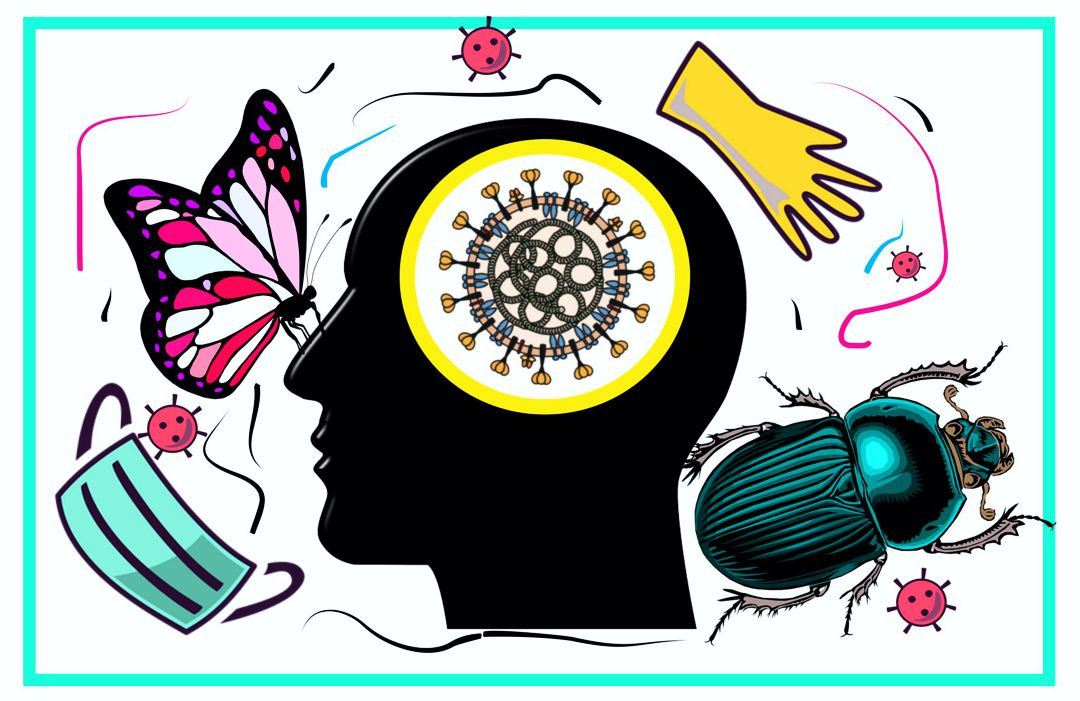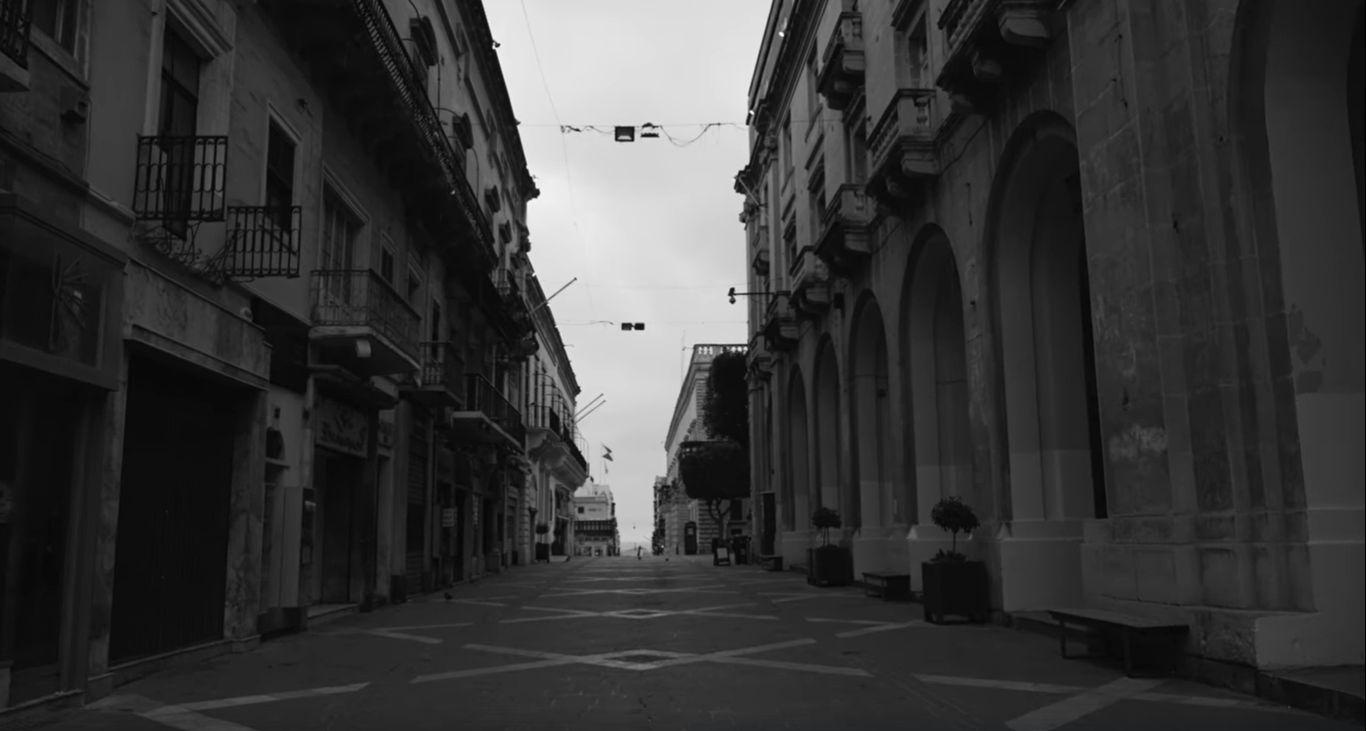
If you believe that COVID-19 was sent by divine providence to make this world a fairer, greener place, you are mistaken. It’s up to us to strive for this goal. A virus has no such mission.
by Kathrin Schödel
Collage by the IotL Magazine
[dropcap]T[/dropcap]he COVID-19 pandemic, which has led to millions of people around the globe being under quarantine and in isolation, is changing our lives in ways we could not anticipate. In this exceptional situation, we all attempt to make sense of what is happening.
Staying informed about the best individual behaviour as well as about governmental decisions is crucial. Many also want to know more about the background of the drastic public health decisions affecting us all. Needless to say, all research into the new virus and its spread is invaluable.
Understandably, there are calls for upholding positive thinking in these difficult times. A search for a silver lining can help our psychological well-being. But there is one way in which trying to get to grips with COVID-19, ultimately, does not make sense: endowing it with a deeper meaning or purpose.
“Gateway to a Golden Age”
Judging by some reactions to the current state of emergency, many perceive this pandemic in predeterministic, almost Biblical, terms—as though the virus was sent to mankind by some divine providence to teach us all a lesson. Many seem hopeful that a virus for which there is no cure yet, is itself a cure for our social ills—or may even be here to cure the planet from the disease of mankind. A doomsday which will ultimately lead to salvation.
But such a line of thought is flawed. A virus has no higher mission. In its simplicity, it even stands apart from other living creatures: it consists of genetic material in protein packaging only. Its goal is simple: to replicate.
A virus has no higher mission. Its goal is simple: to replicate.
It has not come, as many have reasoned, ‘to give earth a break’, nor has it come to teach people discipline and to make, for instance, Maltese “queue in an orderly fashion”. Yes, the pandemic has deeply impacted individual behaviour as well as social habits and norms. It has also exposed the close relationship between economic activity and the environment clearly: the forced economic slowdown has led to better air quality, also in Malta, and to a drop in CO2 emissions.
However, I believe that framing this pandemic in such positive terms—as a challenging but eventually beneficial circumstance that will almost automatically right all wrongs and show us a way forward to a brighter future – is a harmful, even if tempting, interpretation.
It is not only cynical to try and give the outbreak of a disease a positive meaning while it is causing suffering and death to many, it is also dangerously misleading.
The pandemic is, in fact, making social and economic faults more visible, but a resulting crisis cannot automatically offer solutions. If we assume that positive effects will somehow come about by themselves, we overlook how public health measures are not available to everyone equally and are already contributing to a widening of inequality.
The pandemic is, in fact, making social and economic faults more visible, but a resulting crisis cannot automatically offer solutions.
We also too readily accept measures needed to curb the spread as generally good. In other words, we fail to realise that the far-reaching positive changes we may hope for will have to be fought for—they will not magically appear after this apocalyptic spell.
Public Health and Privatisation of Responsibility
Public health is a major pillar of our common wellbeing and something to be fully supported at all times. More awareness of this is being fostered by the more thoughtful media outlets, expert and political speeches. But expecting a pandemic to deliver efficient affordable public healthcare or to lead to a more just society is rather delusional.
The nature of this disease, together with the way societies are currently organised, means that public health measures now result in accelerated privatisation of responsibility for one’s own wellbeing. This applies not only to physical distancing and withdrawal into private spaces, but also in the sense that people have to rely upon their private means even more than before.
Self-quarantine exacerbates the problems faced by victims of domestic violence and by people with mental health issues. It also aggravates differences in material wealth and social class.

Can you afford to look after your child at home or do you have to fear losing your job if you stay at home? Can you afford the delivery of nice meals, or do you have to keep going to the supermarket because cheap delivery is overbooked? Are you working in the supermarket or delivery services and are not well protected from infection? Do you self-quarantine in a large house with private outdoor spaces, or do you live in small, shared and badly-ventilated accommodation?
These and numerous similar ways in which the pandemic exacerbates existing inequalities have been broadly reported. But the insight that the health of the poorest may influence everyone’s health does not have much of an influence on governmental decisions.
Addressing this inequality would currently require a change in policies (such as the introduction of a universal basic income, for example) to ensure that even those whose jobs are precarious can afford to follow self-quarantine rules. Accommodation would have to be provided for those lacking proper housing and many more measures should be taken to avoid making fragile people even more fragile.
Emergency Measures—Hardly a Motor for Positive Change
Of course, we all have to try and make the best of this situation, and reading the odd book that’s been waiting on the shelves for long may be a nice moment. But, honestly, do you think a pandemic is an ideal basis for starting a crash course on meditation?
The expectation to regard increasing isolation in positive terms can be a further burden, as much as expectations of unleashing our latent creative genius.
When you are not succeeding in using this time for a new hobby, for serene contemplation, or you are nowhere near to inventing calculus 2.0, such fruitful examples and advice may well make you feel more depressed.—No, we have not all enrolled in a special course on being productive in isolation, we are reacting to an emergency.
In education, it is great to have the means of continuing teaching and learning via various online media. However, as many have pointed out, this should not be idealised as a step towards modernisation everyone was just too lazy to take before. There were and are good reasons for preferring classroom teaching to online methods in many contexts.
If the current transition towards digital communication and online teaching goes all too smoothly, this might be an excuse for cutting jobs in education and elsewhere.
If anything, this current isolation makes more painfully clear how meeting in real spaces is crucial for communication and wellbeing. I have never missed sharing a moment of laughter in class more acutely than now, and the liberty of having a discussion without anyone being intimidated by technology.
In addition, of course, if the current transition goes all too smoothly, this might be an excuse for cutting jobs in education and elsewhere. After all, this is a process of automation—something people were beginning to worry about before this pandemic. The current situation should make us even more critical of its impact in a system where less human work means the loss of jobs and livelihoods.
Empty Streets—a Welcome Break for Nature?
The metaphor of human beings as a disease that the planet needs to be cured of has existed for a while in some versions of environmentalism. It is illogical, of course, because the planet as such has no purpose, no will, no suffering.
The important insight into the impact of human behaviour on the suffering of other species, as well as the current focus on the influence of capitalist-driven exploitation of nature on the likelihood of the spread of viruses from animals to humans, needs to be clearly distinguished from an imaginary of mankind as disease.

To regard quarantine and lockdown measures as a supposed panacea to climate change is to indirectly assume that human suffering—or even vanishing of humankind—is necessary to halt the rising temperatures, whereas the reasoning should be the opposite: extreme weather events must be prevented because they will lead to more suffering around the globe.
Taken to its logical conclusion, seeing humanity as disease leads to fantasies of extinction, to brutal ideas about overpopulation—which, ironically, always view the other as excess, but never oneself and one’s imagined community. Current celebrations of the aesthetics of empty streets and an enthusiasm for the break nature seems to be taking—or the lesson in humility it seems to be teaching us—are dangerously close to these ruthless ideologies.
To regard quarantine and lockdown measures as a supposed panacea to climate change is to indirectly assume that human suffering—or even vanishing of humankind—is necessary to halt the rising temperatures.
Admiring deserted public spaces during this pandemic suggests a specific viewpoint of a privileged spectator who would generally rather not share these spaces with others and reserve them for their own solitary enjoyment. Now that empty streets have become a common sight, have they not lost their allure? Previously spaces for socialising and sharing experiences, they are now turning into symbols of disease, isolation and fear.
By idealising the emptiness of streets and squares as beautiful, we forget about the suffering that is invisible—the suffering of those battling for their lives with the virus inside their homes and hospital wards.
While embracing current measures of physical distancing and retreat into private spaces, it is important to remember streets and squares as shared public spaces where we meet, discuss, protest—the arena of the democratic public.
Act in Solidarity and Fight for a Better World—the Virus Has No Such Mission
If we long for a beneficial outcome of this crisis—a fairer world and a better environment—we must remain creative, active and politically radical. The virus is no agent of positive change. We cannot outsource the struggle for obligatory and long-awaited political shifts to a genetic molecule in protein wrapping.
Take the environment: if after this outbreak, global capitalism will resume its business as usual, pollution and emissions will most probably come back with a vengeance because enterprises will seek to make up for the current losses. An increase in pollution and emissions might well outweigh the current reductions and the effect of the ‘break’ would be cancelled out.
Instead of trying to endow a virus with a mission, let’s focus on the man-made causes of vulnerability, including that to a new disease.
Instead of trying to endow a virus with a mission, let’s focus on the man-made causes of vulnerability, including that to a new disease, of environmental destruction and the ever more far-reaching exploitation of nature, which likely contributed to the origin of this pandemic as well as causing on-going climate change.
Let’s strengthen the fight against inequality, which, unfortunately, has always had deadly consequences. We need to make sense of the economic and political system we are forced to live in—whose faults the pandemic exposes—and we need to fight its structural basis in inequality and exploitation of people and nature. We don’t need to see a virus as an act of divine providence.

Leave a Reply